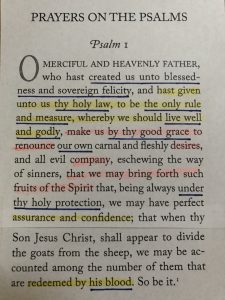Dr. David B. Calhoun, longtime (and now Emeritus) Professor of Church History at Covenant Theological Seminary, is one of the great gifts God has given to his church in my lifetime, and also, perhaps, a too well kept secret. His writings and lectures ought to be read and digested by all of us in the Presbyterian and Reformed family. He is a man of keen theological judgment, great devotional instinct, and wide sympathies. His edition of the prayers of the Scottish Psalter is a spiritual classic. Use it as you read and pray through the Psalms. It is called “Prayers on the Psalms” and is published by Banner of Truth.
The devotional-theological-practical-experiential genius of these prayers is on display in the gospel-soaked prayer accompanying Psalm 1.
Note just some of the helpful emphases squeezed into this very short prayer:
1. “O Merciful and Heavenly Father” – The prayer comes to the FATHER, who is merciful and heavenly, created us in blessedness and felicity (true, deep, happiness), gives us the holy law for a life well lived, grants us grace, keeps us under his holy protection, wants us to have assurance and confidence of salvation, gives his own Son Jesus to redeem us by his blood. What a Father smiles upon us!
2. “Created us unto blessedness and sovereign felicity” – We are reminded that we are created unto, with a view to blessedness and felicity — true, deep, real, happiness. This felicity is sovereign – dispensed out of God’s loving and good and generous heart, unearned, undeserved, and uncompelled by us. The very first words from God to man were blessings. Genesis 1:28. How kind, how lavish, he is to his creatures.
3. “Hast given unto us thy holy law” – We rehearse to ourselves that God gave us his law, not to curse us, not to frustrate us, and certainly not so that we could earn our salvation, but so that we would know the only way to “live well and godly” that is, to live the good life, the true good life, a good and Godward life.
4. “Make us by thy good grace” – The prayer is nevertheless a Gospel prayer. By virtue of the fall and our corruption, we now can only live this life by God’s grace and protection, and through the blood of Jesus Christ. We need God’s grace and protection, and Jesus’ blood, to live well and godly, and to have assurance and confidence.
5. “Make us by thy good grace to renounce . . . that we may bring forth such fruits of the Spirit” – This is a beautiful summary of sanctification, both mortification and vivification. That is, by grace, and by the power of the Spirit, we renounce “our own carnal and fleshly desires and all evil company” [in other words, we fight against our own inward inclinations and tendencies to sin, as well as take care to avoid the outward settings and occasions of sin], and also, positively, live in newness of life, bearing Spiritual fruits.
6. “That . . . we may have perfect assurance and confidence, that . . . we may be accounted among the number of them that are redeemed by his blood.” – Notice here the dual emphasis: a strong petition for believers to be assured and also an acknowledgment of the assuring function of sanctification (without making sanctification the ground of our final acceptance). In the end, we are “redeemed by his blood.” “Jesus, Thy blood and righteousness My beauty are, my glorious dress;” “Bold shall I stand in Thy great day; For who aught to my charge shall lay?”
